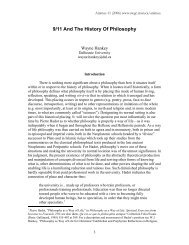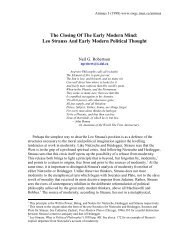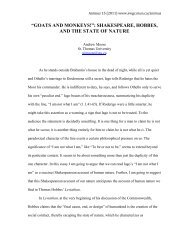Neoplatonism And The Hegelianism Of James Doull1
Neoplatonism And The Hegelianism Of James Doull1
Neoplatonism And The Hegelianism Of James Doull1
You also want an ePaper? Increase the reach of your titles
YUMPU automatically turns print PDFs into web optimized ePapers that Google loves.
D.G. MACISAAC: NEOPLATONISM AND THE HEGELIANISM OF JAMES DOULLomitting Nous, seek to agree with Heidegger while avoiding his criticisms, seem only tofall into the same historicist position. 13This has been a lengthy preamble to my examination of the Neoplatonic logic ofthe one over the many as it governs the structure of thought, but it was necessary tosuggest what is at stake. My examination will focus in particular on two aspects of thephilosophy of Proclus, but I intend my observations to apply to all <strong>Neoplatonism</strong>. <strong>The</strong>first aspect is the relation between unity and multiplicity in the activity of thinking, andthe second is the crucial distinction between noetic and discursive reason.With regard to the first point, the relation between unity and multiplicity could beconceived in the following terms: either the One stands completely aloof from themultiplicity which it generates, or somehow that multiplicity can be found as themoments within the One itself. Here is the source of seeing mutually opposed apophaticand kataphatic traditions. Doull sees the first tradition as a necessary moment leading toits completion in the second. However, I think these two traditions can be seen ascomplementary in a manner which does not smuggle the noetic multiplicity into the One,and so does not have to posit the seeming impossibility of a simple One which alsocontains in itself a triadic self-reversion.Professor Doull describes the activity of knowing in <strong>Neoplatonism</strong> in thefollowing manner: “<strong>The</strong> knowledge the noetic self-consciousness has of itself and of itsworld as its own is abstract so far as the moment of division or mediation is transitionalonly and lost in the return.” 14 In Proclus both Nous and Soul are structured according to aremaining in, procession from, and return to their cause: the One for Nous, and Nous forSoul. This triadic motion structures not only the relation between the various orders ofProclus’ system, it gives the internal structure of what has become orders or taxeis, whichcorrespond to the Plotinian hypostases. Doull’s reading of this threefold activity is that inthe moment of return, the division which emerges in the moment of procession is lost,and hence the principle cannot contain the divided procession, which becomes only avanishing moment. It is in order to correct this that he thinks philosophy moves towardsHegel, whose principle is self-dividing.But the mistake here which Doull makes is in his characterisation of the momentof return. I have studied this relation before, and I make here some of the points which IIV13 Cf. W.J. Hankey, "<strong>Neoplatonism</strong> and Contemporary Constructions and Deconstructions ofModern Subjectivity," a response to J. A. Doull’s “<strong>Neoplatonism</strong> and the Origins of the Older ModernPhilosophy” for a festschrift for <strong>James</strong> Alexander Doull, Philosophy and Freedom: <strong>The</strong> Legacy of <strong>James</strong>Doull, edited by David G. Peddle and Neil G. Robertson (Toronto: University of Toronto Press, 2003) pp.250-278. See also W.J. Hankey's contribution in Lévinas et l’héritage Grec, par Jean-Marc Narbonne(pages 1-122), suivi de Cent ans de néoplatonisme en France: Une brève histoire philosophique, parWayne Hankey (pages 123-268), Paris/Québec, Collection Zêtêsis, Libraire Philosophique J. Vrin/LesPresses de l’Université Laval, 2004.14 “<strong>Neoplatonism</strong> and the Origin of the Cartesian Subject”, par.43; p. 227.8
















